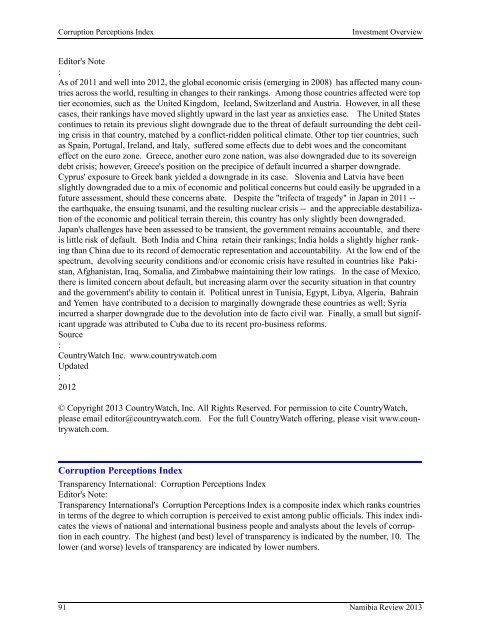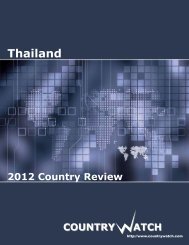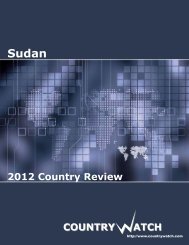Namibia - CountryWatch
Namibia - CountryWatch
Namibia - CountryWatch
Create successful ePaper yourself
Turn your PDF publications into a flip-book with our unique Google optimized e-Paper software.
Corruption Perceptions Index Investment Overview<br />
Editor's Note<br />
:<br />
As of 2011 and well into 2012, the global economic crisis (emerging in 2008) has affected many countries<br />
across the world, resulting in changes to their rankings. Among those countries affected were top<br />
tier economies, such as the United Kingdom, Iceland, Switzerland and Austria. However, in all these<br />
cases, their rankings have moved slightly upward in the last year as anxieties ease. The United States<br />
continues to retain its previous slight downgrade due to the threat of default surrounding the debt ceiling<br />
crisis in that country, matched by a conflict-ridden political climate. Other top tier countries, such<br />
as Spain, Portugal, Ireland, and Italy, suffered some effects due to debt woes and the concomitant<br />
effect on the euro zone. Greece, another euro zone nation, was also downgraded due to its sovereign<br />
debt crisis; however, Greece's position on the precipice of default incurred a sharper downgrade.<br />
Cyprus' exposure to Greek bank yielded a downgrade in its case. Slovenia and Latvia have been<br />
slightly downgraded due to a mix of economic and political concerns but could easily be upgraded in a<br />
future assessment, should these concerns abate. Despite the "trifecta of tragedy" in Japan in 2011 --<br />
the earthquake, the ensuing tsunami, and the resulting nuclear crisis -- and the appreciable destabilization<br />
of the economic and political terrain therein, this country has only slightly been downgraded.<br />
Japan's challenges have been assessed to be transient, the government remains accountable, and there<br />
is little risk of default. Both India and China retain their rankings; India holds a slightly higher ranking<br />
than China due to its record of democratic representation and accountability. At the low end of the<br />
spectrum, devolving security conditions and/or economic crisis have resulted in countries like Pakistan,<br />
Afghanistan, Iraq, Somalia, and Zimbabwe maintaining their low ratings. In the case of Mexico,<br />
there is limited concern about default, but increasing alarm over the security situation in that country<br />
and the government's ability to contain it. Political unrest in Tunisia, Egypt, Libya, Algeria, Bahrain<br />
and Yemen have contributed to a decision to marginally downgrade these countries as well; Syria<br />
incurred a sharper downgrade due to the devolution into de facto civil war. Finally, a small but significant<br />
upgrade was attributed to Cuba due to its recent pro-business reforms.<br />
Source<br />
:<br />
<strong>CountryWatch</strong> Inc. www.countrywatch.com<br />
Updated<br />
:<br />
2012<br />
© Copyright 2013 <strong>CountryWatch</strong>, Inc. All Rights Reserved. For permission to cite <strong>CountryWatch</strong>,<br />
please email editor@countrywatch.com. For the full <strong>CountryWatch</strong> offering, please visit www.countrywatch.com.<br />
Corruption Perceptions Index<br />
Transparency International: Corruption Perceptions Index<br />
Editor's Note:<br />
Transparency International's Corruption Perceptions Index is a composite index which ranks countries<br />
in terms of the degree to which corruption is perceived to exist among public officials. This index indicates<br />
the views of national and international business people and analysts about the levels of corruption<br />
in each country. The highest (and best) level of transparency is indicated by the number, 10. The<br />
lower (and worse) levels of transparency are indicated by lower numbers.<br />
91 <strong>Namibia</strong> Review 2013




